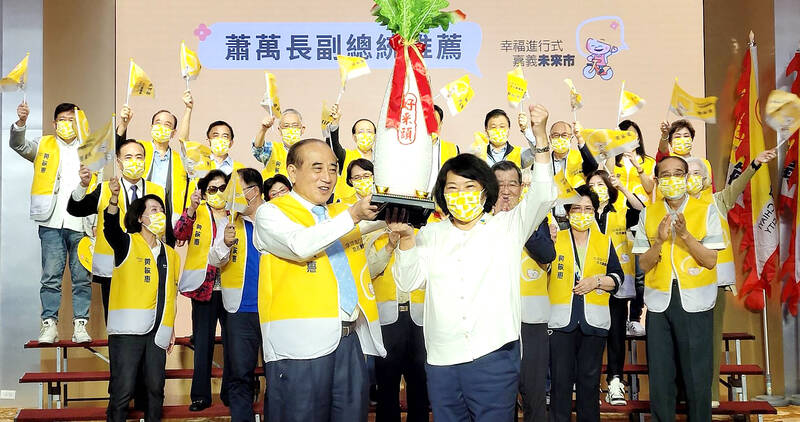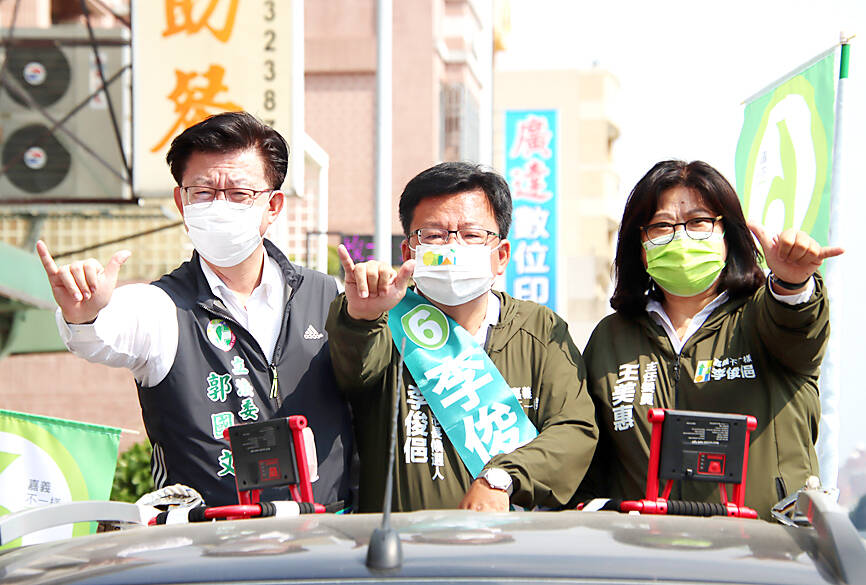The Chiayi mayoral election is to be held on Dec. 18, the Central Election Commission (CEC) said on Thursday, one day after the electoral process was stopped following the death of Huang Shao-tsung (黃紹聰), an independent candidate running in the election originally scheduled for Nov. 26.
The process was stopped based on Article 30 of the Civil Servants Election and Recall Act (公職人員選舉罷免法), dubbed the “anti-assassination clause,” which requires the commission to terminate the process if a candidate dies up to one day ahead of the scheduled vote.
The decision was made jointly with Chiayi City Election Committee representatives, CEC Director-General Huang Chun-ming (黃俊銘) said.

Photo: Ting Wei-chieh, Taipei Times
Registration for candidates would be open from tomorrow until Saturday, and their numbers on the ballot would be drawn on Nov. 29, Huang Chun-ming said.
Huang Shao-tsung was found unconscious on the floor in a bathroom in his home early on Wednesday. He was rushed to hospital, where he was pronounced dead, with the cause of death being heart attack.
CEC Deputy Chairman Chen Chao-chien (陳朝建) said the rescheduling would not affect the inauguration of the winner in the mayoral election on Dec. 25.

Photo: Lin Yi-chang, Taipei Times
Chiayi Mayor Huang Min-hui (黃敏惠) of the Chinese Nationalist Party (KMT), who is seeking re-election, and her Democratic Progressive Party (DPP) challenger, Lee Chun-yi (李俊俋), have said that delaying the vote would put a strain on electoral resources.
Calling the decision “regrettable,” Huang Min-hui said that holding the mayoral election in Chiayi on a different date than nationwide local elections would require about 3,500 additional election workers, which would be hard to find.
Asked whether she is worried about becoming the DPP’s sole focus after Nov. 26, Huang Min-hui said that many of her supporters were concerned, but she is ready to deal with the situation.
Lee said that he would campaign “until the end” — for DPP Chiayi city councilor candidates in the Nov. 26 election, and ahead of the mayoral vote next month.

CAUTION: Based on intelligence from the nation’s security agencies, MOFA has cautioned Taiwanese travelers about heightened safety risks in China-friendly countries The Ministry of Foreign Affairs (MOFA) yesterday urged Taiwanese to be aware of their safety when traveling abroad, especially in countries that are friendly to China. China in June last year issued 22 guidelines that allow its courts to try in absentia and sentence to death so-called “diehard” Taiwanese independence activists, even though Chinese courts have no jurisdiction in Taiwan. Late last month, a senior Chinese official gave closed-door instructions to state security units to implement the guidelines in countries friendly to China, a government memo and a senior Taiwan security official said, based on information gathered by Taiwan’s intelligence agency. The

The National Immigration Agency (NIA) said yesterday that it will revoke the dependent-based residence permit of a Chinese social media influencer who reportedly “openly advocated for [China’s] unification through military force” with Taiwan. The Chinese national, identified by her surname Liu (劉), will have her residence permit revoked in accordance with Article 14 of the “Measures for the permission of family- based residence, long-term residence and settlement of people from the Mainland Area in the Taiwan Area,” the NIA said in a news release. The agency explained it received reports that Liu made “unifying Taiwan through military force” statements on her online

Taiwan Semiconductor Manufacturing Co (TSMC), the world’s largest contract chipmaker, said yesterday that it is looking to hire 8,000 people this year, at a time when the tech giant is expanding production capacity to maintain its lead over competitors. To attract talent, TSMC would launch a large-scale recruitment campaign on campuses across Taiwan, where a newly recruited engineer with a master’s degree could expect to receive an average salary of NT$2.2 million (US$60,912), which is much higher than the 2023 national average of NT$709,000 for those in the same category, according to government statistics. TSMC, which accounted for more than 60 percent

Tung Tzu-hsien (童子賢), a Taiwanese businessman and deputy convener of the nation’s National Climate Change Committee, said yesterday that “electrical power is national power” and nuclear energy is “very important to Taiwan.” Tung made the remarks, suggesting that his views do not align with the country’s current official policy of phasing out nuclear energy, at a forum organized by the Taiwan People’s Party titled “Challenges and Prospects of Taiwan’s AI Industry and Energy Policy.” “Taiwan is currently pursuing industries with high added- value and is developing vigorously, and this all requires electricity,” said the chairman